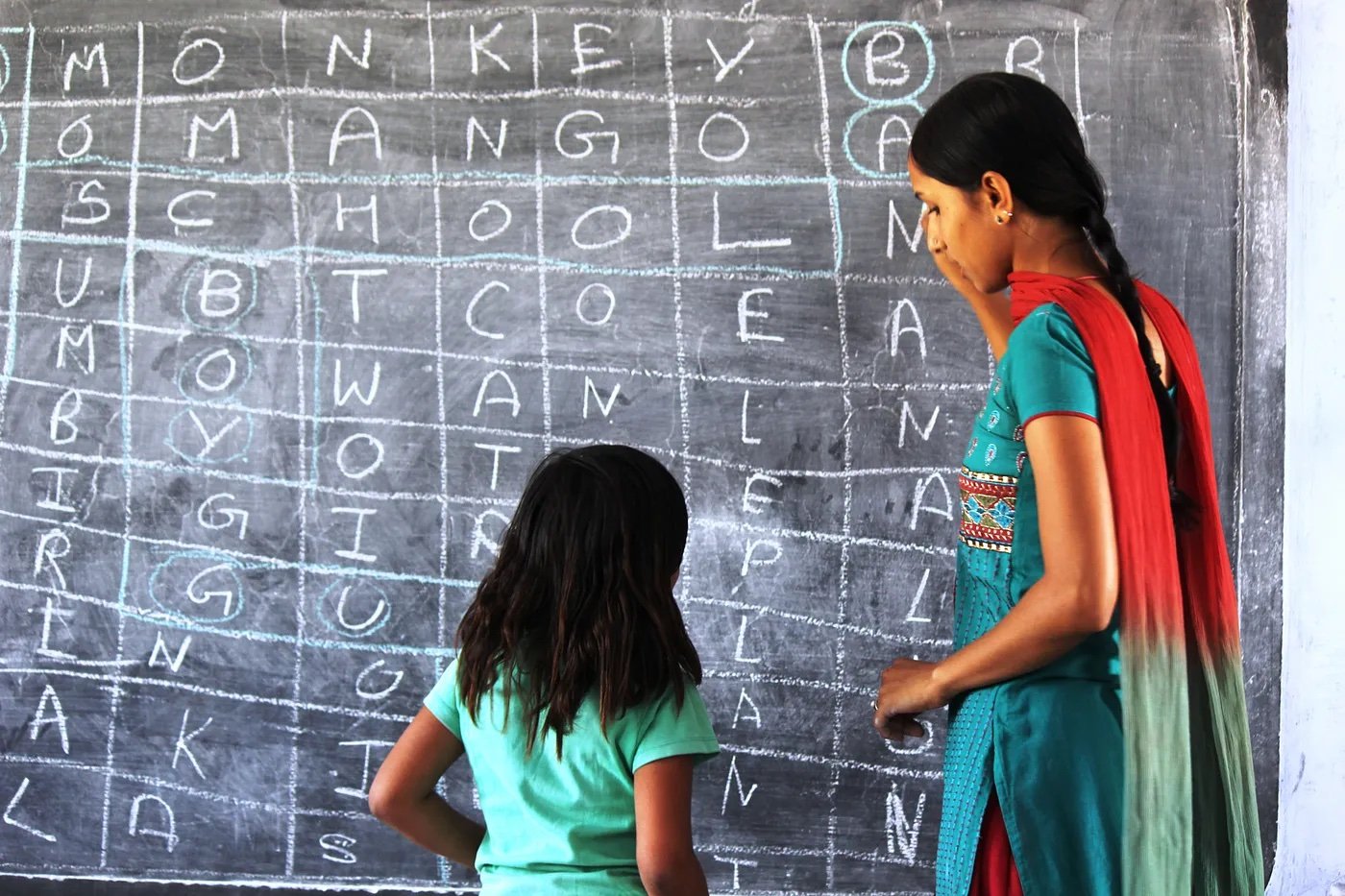Corporate funding for girls — put your money where your mouth is

If one were to look at funding girls as a means to accelerate development as a line graph, the inflection point could be pinned to 2009 when the Nike Foundation, among others, produced their Girl Effect film. This viral video is credited with inspiring action across the private, public and non-profit sectors to empower girls.
It’s fitting that the start of this movement can be, in part, credited to a corporate actor: business has played a huge part in spreading the gospel of girls to audiences far and wide. Campaigns by brands, like Gucci’s Chime for Change, public displays of girl power, like State Street Bank’s “Fearless Girl”, and investment from Coca-Cola and others as part of DFID’s Girls Education Challenge have shown how companies are committed to working with girls.
But what do they tell us, really? While companies are excellent at communicating intention, they are notoriously silent on one of the most critical pieces of information needed to develop the sector: their inputs. This lack of transparency isn’t limited to their work funding girls; but without sharing more about their challenges, failures and investments, companies will struggle to move the needle to create impact for girls.
Our recent I.G. Insights report, The State of Funding for Girls, highlights best practice and offers recommendations on how to fund girls. It’s no secret that the opacity among corporates makes this difficult.
We proudly featured the work of Standard Chartered Bank and their Goal programme, which publicly discloses its investment as part of a Clinton Global Initiative commitment.
In her interview, Director of the Goal Programme Natasha Kwakwa was open about challenges the Bank had faced.
Like many companies, the Bank’s community budget is based on a percentage of its pre- tax income. ‘We have experienced times where the pot of funding hasn’t been as big as perhaps we would have wanted it to be,’ Kwakwa said, referring to 2016 when, in the wake of an economic downturn in several Asian markets, the Bank posted an annual loss.
The team worked with their NGO partner, Women Win, to address these challenges, by supporting them to seek outside funding. As a result, programme momentum continued to grow.
Other companies were not so forthcoming with their information. We stipulated two requirements for all of our interview subjects: they needed to be willing to share their investment data, and to be open to speaking candidly about challenges.
One company got cold feet after interviews had been conducted, and we pulled their case study from the final publication.
Having worked with and for many companies (including Standard Chartered), I can understand the hesitance to share this type of data. CSR programmes, as opposed to corporate foundations, have no legal obligation to report.
There can be concerns about internal and external scrutiny over spending from a ‘cost centre’ like a CSR budget when that information is made public. And not many companies like to admit when something they’ve tried as failed, even if they have learned from it.
This lack of transparency is holding the sector back from achieving the shared value many of these companies purport to desire. In 2015, we reviewed corporate investment in girls’ education; a map of 32 companies’ investments showed clusters around technical and financial skills for secondary school girls and little investment in areas like reproductive health, or the key transition from primary to secondary school.
With more sharing among each other, as well as with foundations and individuals also funding girls, companies could get higher returns on their investment, understand where in the ecosystem investment is needed, and who they could work with to achieve their desired impact.
Our call to companies is this: the benefits of sharing your work with girls far outweigh the perceived consequences. Try it and see — it may set off a chain reaction that creates a new inflection point in the girls’ funding graph.
For more, see the report The State of Funding for Girls.
Originally published at www.alliancemagazine.org on July 26, 2017.
Late last year, a few of us in the Collective Leadership Group began exploring how GenAI could support leadership and development in the social impact space.
We found it could grasp the unique challenges social leaders face and uncover relevant learning resources we hadn’t seen before. Its potential to empower underrepresented and underserved changemakers quickly became clear…
Institutions don’t drive change. People do. People are the idea generators, project implementers, and system shakers. Yet, while we often talk about the importance of investing in organisations, we rarely think about investing in the people who lead them.
Since March 2022, I.G. Advisors has worked closely with Kurt Geiger to design and implement Business by Design—a fully-funded, AQA-accredited programme co-created with young people to drive access, opportunity, and equity in the creative industries. This isn’t a side initiative—it’s embedded in how the business operates.
As we close the chapter on 2024 and step into a new year, our Advisor, Harriette, finds herself reflecting on what’s needed to move philanthropy forward in 2025.
It’s not a groundbreaking revelation that staff wellbeing and burnout are huge challenges our sector is facing right now, and the sector-wide lack of investment in professional development has a lot to answer for.
Our Associate Advisor Charly makes the case that greater investment in your grantmaking team = greater impact for your organisation, and beyond.
While philanthropy and football may seem worlds apart, I’ve started thinking about the many similarities that can provide valuable lessons for those in the philanthropic sector. I for one, am always learning about the essential elements of football that can inspire and inform effective philanthropy.
Through the power of collective design, our fundraiser and grantmaker #FixTheFlow Fellows have imagined the future of our philanthropic funding system, and we should all listen carefully.
In the coming months, our Associate Carli is exploring the complexities of social innovation and will share her learnings, insights, and questions with you.
I.G.’s CEO Emily shares some of the mistakes and challenges she found during her leadership journey, and what she learned and will share in I.G.’s new Leadership Lab.
I’m expected to show up as a leader, but don’t feel like a leader. Introducing Impact & Grow: A Leadership Lab.
Leveraging Limited Funds For Humanitarians: Insights from the 2024 #HX24 conference, organised by Save the Children UK and the Humanitarian Leadership Academy.
Social enterprises have a particularly interesting relationship with Monitoring, Evaluation and Learning (MEL) as they need to capture both the financial and social/ environmental impact of their work, and speak to a wide range of potential funders and investors. Caitlin McLoughlin chatted to Abhinav Khanal, Co-Founder and Executive Director of Bean Voyage, to explore this further.
Image Credit: Bean Voyage
A round up of everything the I.G. team did in 2023!
Introducing a new, dedicated funders stream to I.G.’s #FixTheFlow Fellowship! We’re accepting applications until 17th November (for a 2024 start). Join our movement at fixtheflow.org
Join us for one (or all!) our eight workshops in our Autumn Training Series, where we will cover some of the trickiest topics facing fundraisers today.
What does meaningful and effective learning actually mean in practice?
Our Advisor Caitlin interviews Kore Global’s Emily Boost on learning how to learn and all things feminist evaluation and learning.
How do we balance our passion and our desire to give our best, whilst not being consumed by failure to live up to our own or others’ expectations?
At I.G. Advisors (I.G.), we’re often approached to design and implement evaluations for our clients to understand the impact of their grantmaking, fundraising or programmatic strategies, and identify opportunities for evolution.
The ‘lone saviour’ approach won’t cut it (and it also might destroy you).
It’s hard to believe it now that we’re living through a polycrisis, but the financial crisis and Great Recession of the 00s felt like a once-in-a-lifetime jolt to the world order at the time.
What you can learn from others leading philanthropic networks like yours
‘Well, we could have called that one.’
I.G. Advisors (I.G.) recently had the pleasure of collaborating with The Big Give and Rosa on the Women and Girls Match Fund.
Being a parent is often a thankless task. You take something and nurture it, treating it with love and care, losing sleep and worrying if — against all odds — , it will achieve its full potential and become the best it can be. It may never, ever show gratitude for your sacrifice. And then one day it will grow up and leave.
New I.G. Insights report explores how fundraisers and funders can support digital fundraising for racial justice issues.
#TaxPhilanthropy — wealth holders have the power to pay more tax right now even if governments fail to reform their policies






























